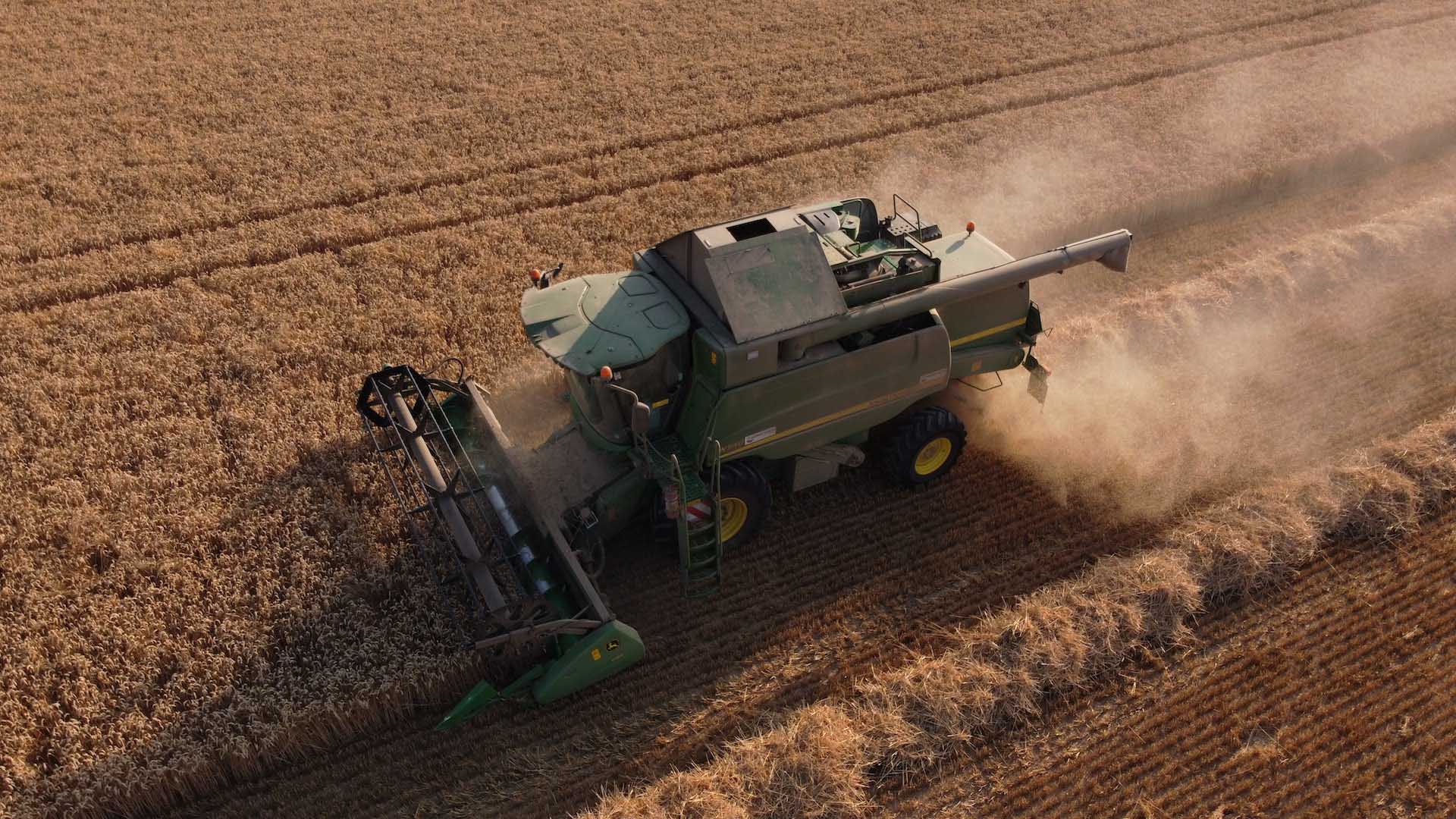Trending: Here are some Business Statistics and Trends to know

|
Getting your Trinity Audio player ready...
|
Have you ever wondered how the food on your plate gets there? It’s not just about farmers planting and harvesting crops. The food industry is a complex system that involves various stages, from production to consumption. And at the centre of it, all is agribusiness.
Agribusiness is a term used to describe the various activities involved in producing, processing, and distributing agricultural products. It’s a crucial industry that plays a significant role in the economy and food security of many countries around the world.
In this article, we will explore some examples of agribusiness and how they operate. From large-scale commercial farming to small family-owned operations, we’ll take a closer look at the different types of agribusiness and how they contribute to feeding the world’s population.
Agribusiness
Agribusiness is a combination of the words “agriculture” and “business” and refers to any business related to farming and farming-related commercial activities.
What is Agribusiness?
Agribusiness is a broad term that refers to the industry of agricultural products and services involved in growing, processing, and distributing food. It encompasses a full range of activities, from planting and harvesting crops to food processing and distribution.
The agribusiness industry also produces materials grown for non-consumable products. With the world population on the rise, agribusiness has become an increasingly vital industry, with the global market projected to reach $7.4 trillion by 2030.
The agriculture industry is made up of small and large-scale farming operations, farming equipment such as tractors and harvesters, growth aids like fertilizer, food processing plants and distribution chains involved in shipping, storing and selling food. The industry employs millions of people worldwide, making it a significant contributor to economic growth.
Agribusiness plays a critical role in the food supply chain, ensuring that food is produced, processed, and distributed efficiently. The main component of agribusiness is creating products for consumption such as meat, vegetables, fruit, grains, and dairy. However, it’s not just about food production; agribusiness also creates materials produced by plants or animals that are used to make other products like textiles.
Additionally, agribusiness uses natural elements like forests to make consumer products, and farms also produce energy such as biofuel to serve as renewable fuel sources.
The four “F’s” serve as a helpful reminder of the key elements of agribusiness:
- Food: The main component of agribusiness is creating products for consumption such as meat, vegetables, fruit, grains, and dairy.
- Fiber: Materials produced by plants or animals help create other products like textiles.
- Forest: Agribusiness uses natural elements like forests to make consumer products.
- Fuel: Farms produce energy such as biofuel to serve as renewable fuel sources.
For those interested in pursuing a career in agribusiness, many colleges and universities offer programs that focus on the science and economics of agriculture management. Graduates with a specialization in agribusiness typically find careers in farm operations, agricultural finance, and merchandising.
Agribusiness is a vital industry that plays a critical role in ensuring food is produced, processed, and distributed efficiently. As the global population continues to grow, the demand for agricultural products and services will continue to increase, making agribusiness an essential part of the global economy.
Why is agribusiness important?
Agribusiness plays a pivotal role in the growth and development of the agricultural industry, which in turn drives economic prosperity across nations. By enabling countries to export their products, agribusiness expands revenue streams and fosters global trade.
Here are some noteworthy benefits of agribusiness:
1. Enhances agricultural productivity: Agribusiness boosts productivity and efficiency by utilizing innovative food production technologies and refining growing techniques. These advances translate into higher yields and improved crop quality.
2. Bolsters food security: Agribusiness pioneers groundbreaking methods for crop cultivation, which can lead to enhanced food security within communities by ensuring a stable and reliable food supply.
3. Promotes sustainable food production: Agribusiness often employs environmentally-friendly practices, such as crop rotation and conservation agriculture, to produce food in a sustainable manner that protects the environment and preserves resources.
4. Lowers consumer food prices: By increasing crop yields and optimizing growing and distribution methods, agribusiness can ultimately lower food costs for consumers, making essential products more accessible and affordable.
5. Alleviates poverty: The reduction of food prices and the creation of employment opportunities within the agribusiness sector can help combat poverty, paving the way for a higher quality of life and socioeconomic growth for communities and countries alike.
Agribusiness examples
The agribusiness sector encompasses a diverse range of activities that contribute to the growth and development of the agricultural industry. This includes every aspect from crop production to the sale of agricultural products.
In this thriving sector, a few key types of agribusinesses stand out as foundational components:
Agrichemical and seed manufacturers
Agrichemicals and seed manufacturers play a vital role in the agribusiness industry. These companies provide essential products that help farmers grow and harvest crops efficiently and effectively.
Agrichemicals, such as pesticides, fungicides, fertilizers, and growth chemicals, are widely used to enhance crop yields and prevent losses caused by pests, diseases, and other environmental factors. Farmers rely on these products to maintain healthy crops and maximize their profitability.
Similarly, seed manufacturers offer a variety of high-quality seeds to farmers, which enable them to plant and grow different types of crops that meet the demand of the market. These seeds are often genetically modified or engineered to withstand various environmental conditions and resist pests and diseases.
Moreover, agrichemical and seed manufacturers invest heavily in research and development to create new and innovative products that can improve crop productivity and yield. They collaborate with farmers, scientists, and researchers to understand the needs of the market and develop products that meet those needs.
Agritourism companies
Agritourism has become an increasingly popular industry in recent years as commercial farms and ranches look for ways to supplement their income. Agritourism can take on many forms, including farmer’s markets, corn mazes, petting farms, and farm tours.
By offering these activities, farmers and ranchers can not only generate additional revenue but can also educate the community about their operations and promote agriculture as a vital part of the economy.
One of the main benefits of agritourism is the opportunity for farmers to diversify their income streams. By inviting visitors to their enterprises, farmers can create new revenue sources beyond traditional agricultural production. This can be particularly beneficial for small-scale farmers who may struggle to generate enough income from farming alone.
In addition to generating revenue, agritourism can also help to promote agriculture and farming practices. Many people are disconnected from the source of their food and may not understand the complexity of modern agricultural operations.
By opening up their farms to visitors, farmers can help to educate the public about the importance of agriculture and the role it plays in the economy.
Animal feed manufacturers
Animal feed manufacturers play a vital role in the agriculture industry by providing farm animals with the necessary nutrition for healthy growth. These companies source the right ingredients to create a nutritious formula tailored to the specific needs of different animal species. They work to ensure that the food they produce promotes optimal health and growth for the animals that consume it.
Animal feed makers supply their products to a wide range of customers in the agriculture sector, including farmers, ranchers, and other businesses that raise livestock. The feed produced by these companies is formulated to provide the right balance of nutrients, such as protein, carbohydrates, and vitamins, to help farm animals thrive.
In addition to providing essential nutrition to animals, animal feed manufacturers also contribute to the overall sustainability of the agriculture industry. By using sustainable practices and sourcing ingredients from responsible suppliers, these companies help minimize the environmental impact of animal agriculture.
Biofuel makers
Agribusiness is a diverse and expansive industry that involves numerous types of companies and organizations working together to support the growth and productivity of the agricultural sector. One of these types of companies is biofuel makers, which play an important role in the development of renewable energy sources.
Biofuel companies are responsible for producing energy from biomass, such as plant or animal waste. As waste is a recurring resource, it is considered a renewable energy option and is used as an alternative to diesel fuel.
The process of creating biofuels involves the use of specialized technology to extract and refine the energy from the waste materials, creating a sustainable source of fuel that can be used in a range of applications.
Biofuels are becoming an increasingly popular alternative to traditional fossil fuels due to their numerous benefits.
For example, biofuels produce lower emissions than traditional fuels, reducing the carbon footprint of transportation and other energy-intensive industries. They also provide an opportunity to reduce dependence on foreign oil sources and increase energy security.
Breeding companies
Breeding companies are an important component of the agribusiness industry as they specialize in raising animals for consumption and breeding them to increase the available stock. These companies work closely with farmers to facilitate the purchase of new livestock, ensuring that the animals are in good health and meet the necessary standards for quality and productivity.
In addition to animal breeding, some companies in this field also breed plant species to grow genetically modified seeds or crops. This helps to create crops that are resistant to pests, diseases, and environmental stressors, leading to improved yields and overall crop quality.
Breeding companies also play a critical role in addressing food scarcity by producing animals that are healthy and capable of producing offspring. By increasing the number of livestock, breeding companies help to meet the growing demand for food and other agricultural products.
Farm machinery producers
Farm machinery producers are an important segment of the agribusiness industry. These producers specialize in creating equipment and machinery specifically for the agricultural sector.
From hand tools to tractors, farm machinery producers aim to provide farmers with the tools necessary to increase their productivity and efficiency.
To stay competitive, farm machinery producers are constantly looking for new ways to incorporate technology into their products. This technology can help farmers with tasks such as planting, harvesting, and maintaining their crops.
By creating equipment that can perform these tasks more efficiently, farmers can increase their yields and reduce their operating costs.
In addition to creating new equipment, farm machinery producers also provide maintenance and repair services to their customers. This helps ensure that farmers’ equipment is operating at peak efficiency, which is essential for the success of their operations.
Farmers’ cooperatives
Farmers’ cooperatives are a vital component of the agribusiness industry. These cooperatives are formed by groups of farmers who come together to conduct business as a unit, sharing resources to reduce costs and create access to goods and services previously unavailable to them.
Farmers’ co-ops are instrumental in enhancing the economic power of farmers by increasing prices for products marketed and lowering the costs of purchased products.
In a farmers’ co-op, members work together to solve common problems and share in the benefits. By pooling their resources and sharing knowledge and expertise, farmers can reduce their expenses and grow their operations. Farmers’ co-ops allow small-scale farmers to have access to the same resources as large-scale farmers, helping to level the playing field in the agricultural industry.
Farmers’ co-ops can be found in many different forms, such as marketing cooperatives, purchasing cooperatives, or service cooperatives. Marketing cooperatives help farmers sell their products by pooling resources and negotiating higher prices for their goods.
Purchasing cooperatives, on the other hand, helps farmers save money on necessary supplies by purchasing them in bulk. Service cooperatives provide farmers with services such as equipment repair, marketing assistance, or financial planning.
Food processing companies
Food processing companies are an essential part of the agribusiness sector, responsible for transforming raw agricultural products into the finished goods that are available on store shelves. This process includes a wide range of methods, such as canning, fermentation, freezing, and pasteurization, among others.
The goal of food processing companies is to produce food that is safe, nutritious, and appealing to consumers. This involves a complex set of processes and techniques that require expertise in food science, engineering, and other related fields.
By transforming raw agricultural products into a range of finished goods, these companies add value to the raw materials and make them more useful for consumers.
Once the food processing companies have completed their work, the finished products are sent to stores and retailers for sale. This process involves a complex network of transportation, storage, and logistics, with a focus on ensuring that the products are delivered quickly and efficiently to their final destinations.
Food processing companies
Food processing companies are an essential part of the agribusiness sector, responsible for transforming raw agricultural products into the finished goods that are available on store shelves. This process includes a wide range of methods, such as canning, fermentation, freezing, and pasteurization, among others.
The goal of food processing companies is to produce food that is safe, nutritious, and appealing to consumers. This involves a complex set of processes and techniques that require expertise in food science, engineering, and other related fields.
By transforming raw agricultural products into a range of finished goods, these companies add value to the raw materials and make them more useful for consumers.
Once the food processing companies have completed their work, the finished products are sent to stores and retailers for sale. This process involves a complex network of transportation, storage, and logistics, with a focus on ensuring that the products are delivered quickly and efficiently to their final destinations.


